I first met Maria Gunnoe a couple of years ago when we had the great fortune to honor her at REVEL with a World Rainforest Award for her courageous and critical work in West Virginia’s Appalachian mountains. I was impressed by her courage and her spirit – and just how engaging and approachable she is.
And just last year I saw her accept a Goldman Environmental Prize for her efforts as an organizer working to save the mountains and the communities she’s from and committed to. As a result of efforts and this attention Maria is gaining some notoriety, and with it there are pros and cons. On the one hand the issue is certainly gaining awareness which is critical if we are going to then raise the consciousness that will lead to an end to this terrible, destructive assault – on the other, those that support Coal (or more likely, the few that benefit the most from it) see Maria as more of a strident agitator than ever.
[youtube W5Wxc5ZltLc]
She’s an 8th generation “mountain holler girl” who lives where her forebears made their home. She’s encircled by mountains – or their remains – and is just at the back of the town of Bobwhite, West Virginia. She has a teenage son and daughter, and a bunch of baby kittens, and two dogs – one her pet, the other for security.
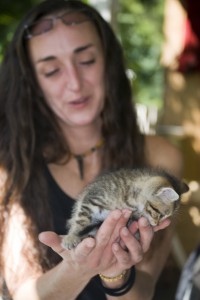
There is also a big, shiny chain link fence around her house. You don’t see many of these in this part of the world. This is for protection – something most folks here don’t need as much as Maria and her family does, though there are several who can very much relate to this necessity.
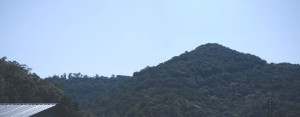
But it hasn’t always been this way. Only since the death threats, the killing of her daughter’s dog that she raised from a pup delivered to her school bus stop, the trucks trying to run her off the road, and more. Recently the coal trains that pass by her house have photographers at the back, cameras pointed her way.
Maria is one of many West Virginians who has deep roots in this part of the world. The old barn has GUNNOE painted on the side – her grandfather built the barn and her Brother painted on the name. And she and her forebears were baptized in the river that runs nearby – though now the water is polluted with chemical waste, part of the “coal washing” process, so the baptisms take place in the church.
The incidence of cancer is on the rise, and given that the water tests show the presence of the same chemicals that you get from processing coal, it’s obvious there is a link between the two. And this link is killing people.
[youtube J3w6j7xXEis]
And it was when the mountains around her home began to disappear, when the flooding started as a direct result of the valley fill behind her house, when what were the Twin mountains in front of her home became one mountain, and the frogs disappeared – these were all some of the signs that the coal companies were damaging her world, and she stood up to them.
[youtube yKTek0C1IBY]
Maria isn’t one to run from a fight, and she’s not backing down from this one.
“The people around me are my friends, I’m not so worried about them. It’s the ones who come from outside to work for Massey – they’re the ones who are causing us all trouble.”
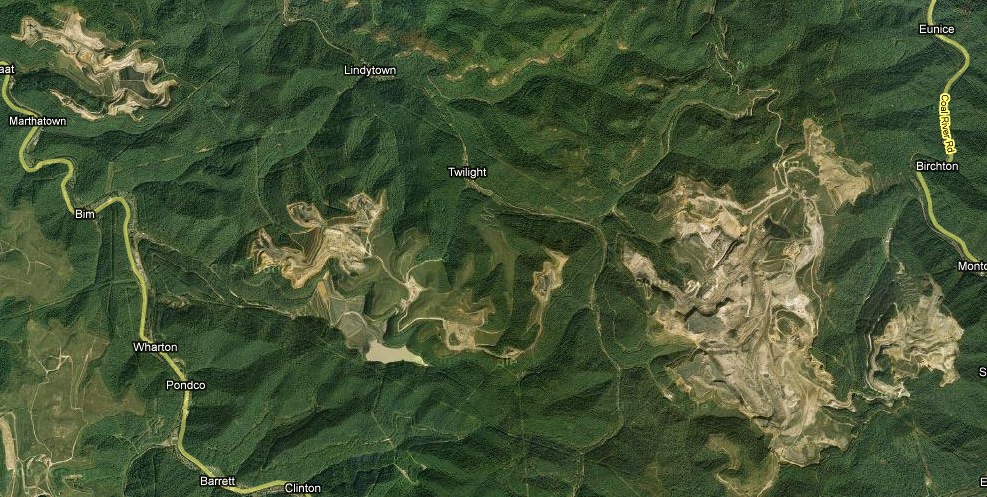
Maria took us to visit her friend, Laura Webb, after driving us through the remains of Lindytown and Twilight – the latest community that Massey has been intimidating and buying out in an effort to depopulate what stands in the way of cheap, easy coal. Laura was one of the last to agree to a buyout – and there wasn’t much reason to stay. Her neighbors had all moved away. The coal operations around her home were literally right above her – and across from her – and behind her. There was no safe place for her or her family anymore here.
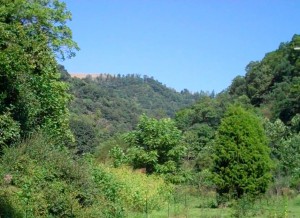
And even after she signed the agreement to sell her property, she was given more messages to get out. One day a truck drove up and a man on the back used a boom to pull down her phone and power lines.
And in an example of how cruel the actors behind the intimidation are, while she was out looking for a place to move her mobile home, her horse was poisoned – she returned home to find it lying on its side in distress, its water trough empty and overturned.
“I stayed up all night with him, but there was nothing I could do to save him.”
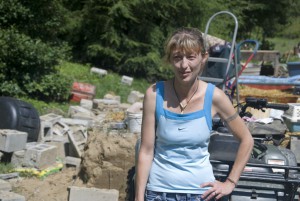
When I saw her she was two days over the agreement date and had a bunch of belongings as well as her house that needed to be moved. Massey could come along at any time and claim whatever is there, even have her arrested for trespassing. For some reason – small blessings – she hadn’t been bothered further as she scrambled to get out of what’s left of her town.
We wished Laura and her family well and Maria then took us up a rough road into the holler. We were going to visit one of three ancient cemeteries that were under threat from mining.
(CGZ blog post http://climategroundzero.org/2009/08/protecting-the-cook-family-cemeteries/)
The company builds fences and erects gates, using public safety as the justification for keeping people out of what had once been their common ground. In fact, for people to now visit any of these burial grounds, if they want to go lay some flowers on their grandparents’ grave or visit an ancestor’s final resting place, they must first undertake a safety training course (on their own dime), engage a company security guard to escort them (on their own dime), and wear hard hats and steel-toed boots which they must provide for themselves.
The cemetery we were heading for today was not available for visitation anymore and its future was in serious doubt. By law the company must provide a 100-ft buffer around such areas, but when Maria and others marked that off they found that their makers had been moved further inwards.
We made it up some treacherous road only to find that the company had moved the line once again, and before we could get to the site we had to turn around or risk arrest and the impoundment of Maria’s jeep. Something she said was assured and not something she could afford. So we turned around.
[youtube sqsLt8-pCyw]
She took us through what was left of Lindytown – rows of empty houses, many of which had been looted and vandalized. Maria asserts that the coal company, Massey, that purchased the properties, opened up the materials to employees if “there was anything they would find useful.
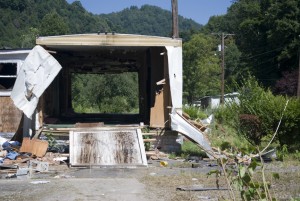
She showed us where less than a year ago children played and families made their home. She showed us where a woman died of a heart attack on the very day she was set to move from her home – her only home, where she had been born. She showed us the failed union hall – a sad statement in an industry-controlled area where unions have no presence, where workers get paid low wages and receive no benefits.
Used to be an underground coal mine would support up to 500 miners – which was good for the community, good for families, and better for the mountains. Non-union MTR employs as few as 19 miners per operation, and once the mountain has been dropped 800 or so feet, the operation closes up and moves on to the next site.
Maria then took us back to her house, passing a “We Support Coal” sign on the local grocery – a business she says serves many more miners than it does locals. Most locals aren’t coal supporters – most locals don’t work the mines. Most locals are suffering from poverty, poisoned water, and constant blasting and would be happy to see King Coal unseated. Maria has many friends locally.
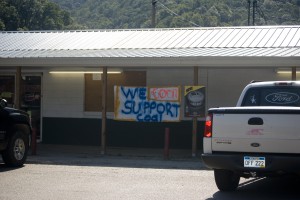
Sometimes she gets chased by mine company employees trying to keep her from making her rounds of visiting sites and people affected by coal mining, and working to protect what’s under threat. She’s had to stop in at friends to switch cars so many times to throw off pursuit she can’t count how many its been. So far she’s been lucky – but she’s afraid of what would happen if she got caught out where there were no witnesses, where she was alone. But she doesn’t dwell on it.
Maria is a bright spirit who has a smile for everyone she meets. She’s gregarious and friendly and she tends to elicit smiles even from the coal miners she comes across at the gas station or convenience stores. Once at the grocery store a Massey employee, dressed in his work uniform, called out above the shoppers to affirm, “I work for Massey and I support Maria Gunnoe 110%!”
These are the kinds of things that show her that this battle can be won. Appalachia can support all sorts of economies, all kinds of industry, from tourism to herbalism to alternative energy. But it’s not going to happen until our government stops issuing the permits that allow the destruction to continue. It’s not going to happen until the Appalachian Restoration Act is made into law.
And it’s not going to happen while Don Blankenship and his ilk continue to hold sway in matters of politics and law enforcement in West Virginia.
But the day is coming when the blasting will stop and the mountains will be peaceful again. That day must come – and soon. The mountains can survive only so long while this assault continues with the support of State and Federal government.
You can find out more about Maria from this Google search, or by visiting the Ohio Valley Environmental Coalition site.